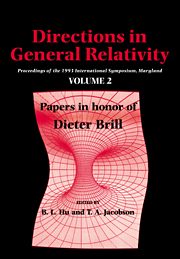 Directions in General Relativity
Directions in General Relativity Book contents
- Frontmatter
- Contents
- Contributors
- Symposium Program
- Papers from both Volumes Classified by Subjects
- Preface
- Dieter Brill: A Spacetime Perspective
- Thawing the Frozen Formalism: The Difference Between Observables and What We Observe
- Jacobi's Action and the Density of States
- Decoherence of Correlation Histories
- The Initial Value Problem in Light of Ashtekar's Variables
- Status Report on an Axiomatic Basis for Functional Integration
- Solution of the Coupled Einstein Constraints On Asymptotically Euclidean Manifolds
- Compact Cauchy Horizons and Cauchy Surfaces
- The Classical Electron
- Gauge (In)variance, Mass and Parity in D=3 Revisited
- Triality, Exceptional Lie Groups and Dirac Operators
- The Reduction of the State Vector and Limitations on Measurement in the Quantum Mechanics of Closed Systems
- Quantum Linearization Instabilities of de Sitter Spacetime
- What is the True Description of Charged Black Holes?
- Limits on the Adiabatic Index in Static Stellar Models
- On the Relativity of Rotation
- Recent Progress and Open Problems in Linearization Stability
- Brill Waves
- You Can't Get There from Here: Constraints on Topology Change
- Time, Measurement and Information Loss in Quantum Cosmology
- Impossible Measurements on Quantum Fields
- A New Condition Implying the Existence of a Constant Mean Curvature Foliation
- Maximal Slices in Stationary Spacetimes with Ergoregions
- (1 + 1)-Dimensional Methods for General Relativity
- Coalescence of Primal Gravity Waves to Make Cosmological Mass Without Matter
- Curriculum Vitae of Dieter Brill
- Ph. D. Theses supervised by Dieter Brill
- List of Publications by Dieter Brill
Jacobi's Action and the Density of States
Published online by Cambridge University Press: 06 January 2010
- Frontmatter
- Contents
- Contributors
- Symposium Program
- Papers from both Volumes Classified by Subjects
- Preface
- Dieter Brill: A Spacetime Perspective
- Thawing the Frozen Formalism: The Difference Between Observables and What We Observe
- Jacobi's Action and the Density of States
- Decoherence of Correlation Histories
- The Initial Value Problem in Light of Ashtekar's Variables
- Status Report on an Axiomatic Basis for Functional Integration
- Solution of the Coupled Einstein Constraints On Asymptotically Euclidean Manifolds
- Compact Cauchy Horizons and Cauchy Surfaces
- The Classical Electron
- Gauge (In)variance, Mass and Parity in D=3 Revisited
- Triality, Exceptional Lie Groups and Dirac Operators
- The Reduction of the State Vector and Limitations on Measurement in the Quantum Mechanics of Closed Systems
- Quantum Linearization Instabilities of de Sitter Spacetime
- What is the True Description of Charged Black Holes?
- Limits on the Adiabatic Index in Static Stellar Models
- On the Relativity of Rotation
- Recent Progress and Open Problems in Linearization Stability
- Brill Waves
- You Can't Get There from Here: Constraints on Topology Change
- Time, Measurement and Information Loss in Quantum Cosmology
- Impossible Measurements on Quantum Fields
- A New Condition Implying the Existence of a Constant Mean Curvature Foliation
- Maximal Slices in Stationary Spacetimes with Ergoregions
- (1 + 1)-Dimensional Methods for General Relativity
- Coalescence of Primal Gravity Waves to Make Cosmological Mass Without Matter
- Curriculum Vitae of Dieter Brill
- Ph. D. Theses supervised by Dieter Brill
- List of Publications by Dieter Brill
Summary
The authors have introduced recently a “microcanonical functional integral” which yields directly the density of states as a function of energy. The phase of the functional integral is Jacobi's action, the extrema of which are classical solutions at a given energy. This approach is general but is especially well suited to gravitating systems because for them the total energy can be fixed simply as a boundary condition on the gravitational field. In this paper, however, we ignore gravity and illustrate the use of Jacobi's action by computing the density of states for a nonrelativistic harmonic oscillator.
DEDICATION
We dedicate this paper to Dieter Brill in honor of his sixtieth birthday. His continued fruitful research in physics and his personal kindness make him a model colleague. JWY would especially like to thank him for countless instructive discussions and for his friendship over the past twenty—five years.
INTRODUCTION
Jacobi's form of the action principle involves variations at fixed energy, rather than the variations at fixed time used in Hamilton's principle. The fixed time interval in Hamilton's action becomes fixed inverse temperature in the “periodic imaginary time” formulation, thus transforming Hamilton's action into the appropriate (imaginary) phase for a periodic path in computing the canonical partition function from a Feynman functional integral (Feynman and Hibbs 1965).
- Type
- Chapter
- Information
- Directions in General RelativityProceedings of the 1993 International Symposium, Maryland: Papers in Honor of Dieter Brill, pp. 28 - 37Publisher: Cambridge University PressPrint publication year: 1956


